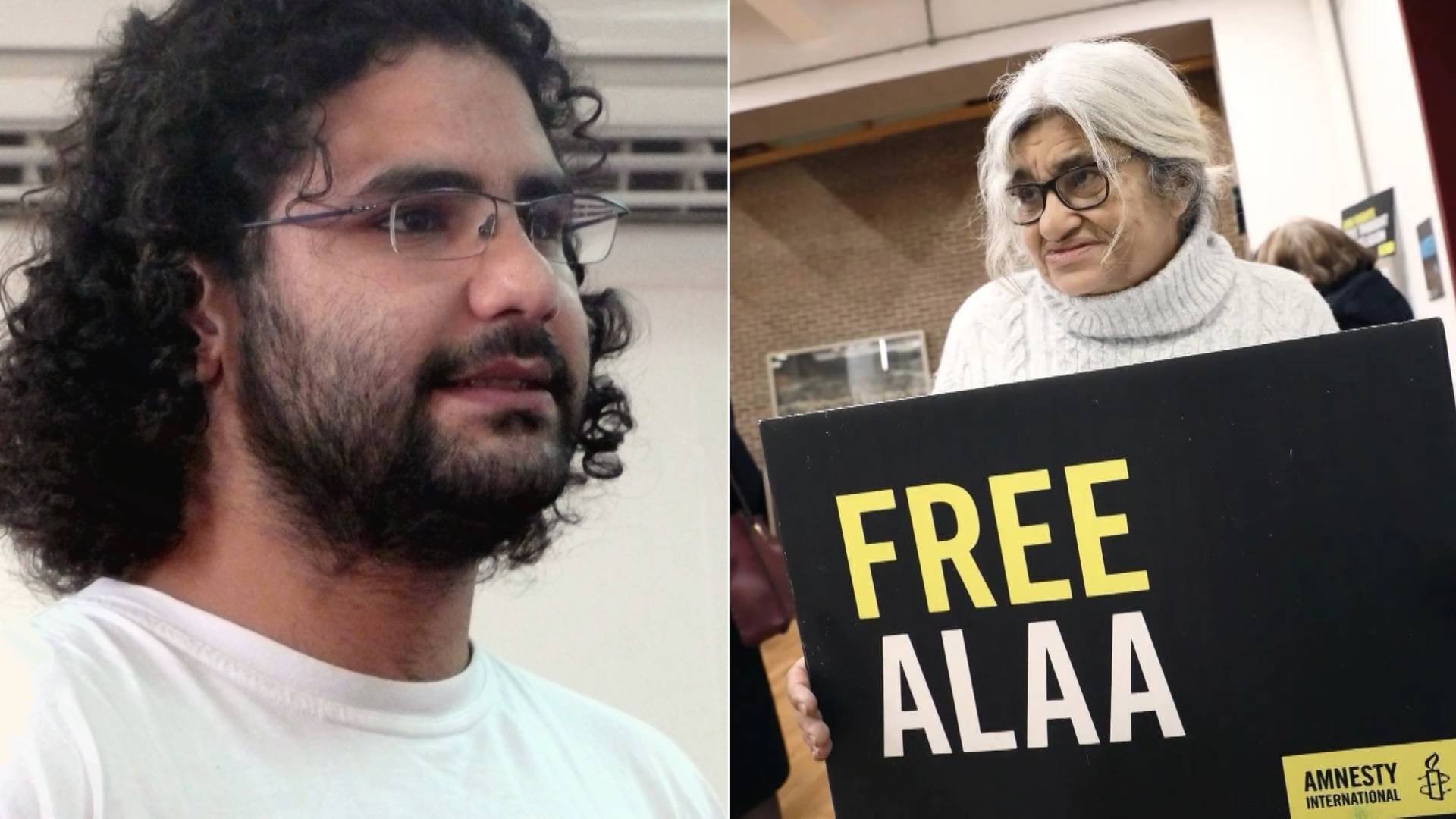This is a rush transcript. Copy may not be in its final form.
AMY GOODMAN: This is Democracy Now!, democracynow.org. I’m Amy Goodman.
Seventy-five days ago, Laila Soueif, the British Egyptian mother of the prominent British Egyptian political prisoner Alaa Abd El-Fattah, stopped eating. Laila Soueif is a mathematics professor at Cairo University. She began her hunger strike as part of a campaign demanding the British government pressure Egypt for the release of her son Alaa.
He was due to be released from prison September 29th, after five years behind bars over unfounded charges of spreading false news. He was rearrested in 2019 just six months after he was conditionally released from prison, where he served another lengthy sentence over his activism in Egypt’s 2011 uprising. Egyptian authorities have refused to count more than two years Alaa spent in pretrial detention toward time served, meaning Alaa now won’t be released until 2027. Alaa has spent most of the last decade behind bars, separated from his family. His agonizing and seemingly indefinite imprisonment is part of a wider crackdown on human rights, press freedom and dissent by the regime of the Egyptian President Abdel Fattah el-Sisi.
Laila Soueif has stepped up her peaceful action, now vowing to stand outside the British Foreign Office in London for at least an hour a day until Alaa is free, she receives an update on his condition or until she collapses. She’ll join us in a minute.
First, this is Alaa, Alaa Abd El-Fattah, speaking in his own words when Democracy Now! first interviewed him in February 2011 during our special coverage of the Egyptian uprising.
AMY GOODMAN: And I’ve just been told that we do have someone on the phone right now, so we’re going to go right to that person. Can you tell us who you are and where you are?
ALAA ABD EL-FATTAH: This is Alaa Abd El-Fattah. I am an activist in this revolution. I’m standing in front of the TV building in Cairo.
AMY GOODMAN: OK. Tell us, Alaa — it’s great to have you with this, a prominent Egyptian blogger, democracy activist — what is happening in front of the presidential palace, one of a number of new places that are being occupied by protesters, like Egyptian state TV, as well, and the parliament.
ALAA ABD EL-FATTAH: In front of the TV building, it’s a big crowd. We can’t shut down the TV building, because of its shape and it’s heavily barricaded by the army. And what we’re trying to do is put pressure on the employees working inside to join us, to revolt and refuse to spread state propaganda.
AMY GOODMAN: Alaa Abd El-Fattah has faced horrific conditions in prison. At the Tora prison complex in 2019, Egyptian police subjected him to beatings and torture. He’s since been transferred, but Amnesty International found prison authorities have denied him access to fresh air and sunlight for the past five years and continue to deny him access to his lawyer and consular visits with British officials.
For more, we go to London, where we’re joined by Laila Soueif. She is Alaa’s mother. She’s 68 years old. Today is the 75th day of her hunger strike.
Professor, thanks so much for being with us. Laila Soueif, we spent time in your home after the U.N. climate summit in Sharm el-Sheikh two years ago, where you were demanding your son’s freedom. He became a main theme, as a political prisoner, of the U.N. climate summit in Egypt. But here you are in Britain as a British Egyptian citizen. Tell us what you are demanding, and tell us how you are feeling right now. Seventy-five days without food?
LAILA SOUEIF: Hello.
Before I speak about me and Alaa, I want to say something inspired by what I heard on your program just before I came on, about Syrians who are disappeared and Palestinians who are disappeared. In Egypt, too, we have enforced disappearances — nothing, of course, on the same scale as Syria, but certainly hundreds, maybe even a lot more. Enforced disappearances are becoming more and more something that dictators, around our area at least, use as a way of intimidating people and families. This has to stop. This has to be taken seriously by — already Western powers turn a blind eye on most of the human rights abuses that their allied regimes practice. Can they at least not turn a blind eye on enforced disappearances? Thank you.
Now to go back to Alaa and me and how I’m feeling. First, let me correct you. I’m 68. And yes, I have been 75 days on hunger strike. At the moment, I’m still not feeling any serious consequences of my hunger strike, mainly, I suppose, because I’m still in the period where, particularly if you’re taking salts with water, the body burns excess fats. It would seem that we have not gone into the phase where the body starts burning muscle and you start having serious consequences.
I have been on — I’m hoping that my hunger strike will create a crisis for both governments, actually. I’m pressuring both governments. I’m binational, and Alaa is binational, so I consider that both governments are responsible for him, particularly since they are friendly and allied governments. I am hoping — since neither government appears to do anything about political prisoners except when there is a crisis, I’m hoping to create a crisis. I’m hoping I’ve already created a crisis. That’s how I’m — that’s what I’m doing, and that’s how I’m feeling.
AMY GOODMAN: Laila, in late November, the British Foreign Secretary David Lammy shared photos on social media of his meeting with you. He wrote, quote, “Today I met with Alaa Abd El Fattah’s family. They have campaigned tirelessly for his release. I’m focused on securing consular access, and his release as quickly as possible. The UK will continue to raise this with the highest levels of the Egyptian Government.” And this is a clip of the British foreign minister recently addressing the Parliament.
DAVID LAMMY: It’s of huge concern, and I pressed him to do more. We have continued to do that with the Egyptians. It’s obviously sensitive because of the situation in Gaza. But I don’t think they’re under any doubt how seriously this is taken by the British system, the government and this Parliament.
AMY GOODMAN: So, that’s the British Foreign Minister David Lammy. Can you explain what are — what kind of pressure Britain can exert on Egypt to release Alaa? Are there negotiations taking place? He has said London’s relationship with Cairo is important, as he has faced questions about possible economic threats in efforts to free Alaa. Also, the British government has repeatedly raised his name at the highest levels. But that clearly hasn’t been enough. Is it true you learned that British Prime Minister Keir Starmer did not raise Alaa’s case when he met with the Egyptian President Sisi on the sidelines of the G20 summit in Brazil? And explain exactly what the terms are that you are demanding right now.
LAILA SOUEIF: Right. Let’s begin with the last question first. No, Mr. Keir Starmer did not raise Alaa’s case during the G20 summit. That’s finally been answered. I mean, an MP demanded and tabled the question about that more than 10 days ago, and he finally got the answer like two days ago or something, or three days ago. So, that’s the — Mr. Keir Starmer did raise the question in August in a phone call with Mr. Sisi. But the difference between August and after 29 September is that on 29 September Alaa finished his sentence. He had been sentenced to five years, however unfair that sentence was, however tainted that sentence was, and he was not released. So, this should have put matters on a completely different level. That’s to your last question.
To go back to Mr. Lammy, yes, it is true that he met with us. It is true that he has been making representations. It is true. But our experience is that the previous government has been making representations to the higher different authorities for years. And my take on this is that when you make representations to the highest authorities and nothing happens, then the message getting through, to me and to the Egyptian authorities, is that this is just lip service, that they don’t really have to do anything about it. If you make representations to the highest authorities and nothing happens, you have to do something else afterwards. You can’t keep making representations to the highest authorities and then not doing anything about it.
What Britain can do, well, Mr. David Lammy, when he was shadow minister, did outline in Parliament what Britain could do. I’ll suggest again, as I have suggested before and as I suggested during our meeting, that he should go back to his own words when he was shadow minister and try and put some of these measures through.
AMY GOODMAN: I want to go back to your son, to Alaa Abd El-Fattah, in his own words. We spoke to him in Cairo a decade ago, in 2014, when he had been released on bail after nearly four months in prison.
ALAA ABD EL-FATTAH: I mean, there’s been activists in Alexandria who have been sentenced for five years, I think — no, two years. Two years. And the verdict was confirmed in the appeals process. There’s been several student groups that have been sentenced, anything from one year to five. These have been common. There’s also a couple of cases where students have been sentenced with crazy, like 14 years and 17 years and 11 years and so on. So, they are on a sentencing frenzy. I mean, this is not just about me. And it’s almost as if it’s a war on a whole generation.
AMY GOODMAN: Alaa Abd El-Fattah in 2014, interviewed by our own Sharif Abdel Kouddous, who was in Cairo at the time. Laila, your final words to the planet, and also if by any chance Alaa can hear you?
LAILA SOUEIF: I want to see Alaa reunited with his son in Brighton. Khaled is autistic. He’s finally settled in a very good special needs school in Brighton. Khaled is 13 this year. He’s missed — Alaa has missed all of his childhood. They need to be together. And until that happens, I am not going to go back on my word. I’m on hunger strike until either I collapse or that happens. I know that this is hard on all my children, particularly Alaa, but they have a life to lead after this, and I hope — well, I hope I will be there for that life. I don’t particularly want to leave them with the memory of a martyred mother. But if that’s what it takes, I want Alaa reunited with Khaled in Brighton.
And these are my words also to the British and the Egyptian authorities. If you want, you know, a sort of shadow haunting all your relations — right? — go on as you’re doing now, the Egyptians being stubborn and the British being hesitant, and that’s what you’ll get. Thank you.
AMY GOODMAN: Laila Soueif, thank you so much for joining us, mother of the jailed Egyptian British author, activist, blogger Alaa Abd El-Fattah. She is on the 75th day of a hunger strike, a fast, calling for the U.K. government to push for Alaa’s release. He’s been imprisoned in Egypt despite having completed his sentence in September. Laila Soueif is a mathematics professor at Cairo University. Stay with us.
[break]
AMY GOODMAN: “Moonshake” by Can. Singer Damo Suzuki passed away in February.











Post comments (0)